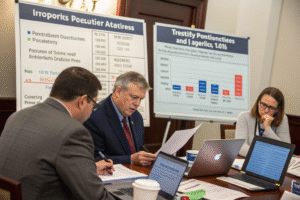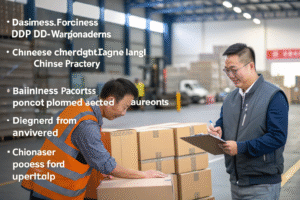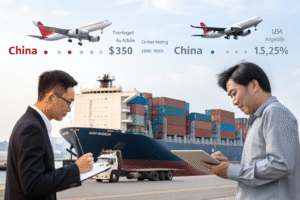Tariff changes can blindside even experienced importers. One week your product qualifies for zero duty, the next it's hit with 25%. When these changes happen mid-shipment, the impact can be devastating—higher costs, missed margins, or even returned goods.
Freight forwarders help you stay ahead of tariff changes by monitoring regulations, advising on classification, and restructuring shipments to avoid unnecessary charges.
With the right logistics partner, you won’t just react to tariff news—you’ll plan for it, minimize its effects, and maintain your profit margins.
How do freight forwarders track tariff updates?
Staying updated on tariffs requires constant monitoring of global trade news and government regulations.
Freight forwarders keep track of country-specific tariffs, customs rulings, and preferential trade agreements—alerting clients before changes affect them.
At GeeseCargo, we follow tariff updates from both Chinese authorities and U.S. Customs to make sure clients like Ron avoid last-minute surprises.

Where do forwarders get tariff change information?
We monitor sources like:
- U.S. Harmonized Tariff Schedule (HTS)
- Customs and Border Protection (CBP) rulings
- China Customs
- Office of the U.S. Trade Representative
We also subscribe to logistics newsletters, customs alerts, and trade publications like Import Genius to stay ahead of trends.
How do forwarders notify clients of new tariffs?
We alert clients via email bulletins, shipment advisories, or direct calls if a change affects their upcoming cargo. For example, if a product shifts from 8% to 25% tariff due to Section 301 updates, we suggest options to revise the product description or shipment timing accordingly.
What role do HS codes play in tariffs?
Your tariff rate depends on the classification code you use. One wrong number could cost you thousands.
Freight forwarders help ensure accurate HS code classification, which directly determines the tariff you pay.
Many importers overlook this step—but forwarders treat it as critical.

How do forwarders verify HS code accuracy?
We work with customs brokers and classification specialists to check if your declared HS code matches the product function and materials. If needed, we submit product samples or specs for a pre-clearance ruling.
For example, a synthetic hair accessory might fall under HS 9615, but if declared as plastic decor under HS 3926, the tariff could change by 15%. The forwarder’s expertise avoids costly misclassifications.
Can HS codes be used strategically?
Yes. Some forwarders assist clients in classifying borderline products under more favorable tariff categories—legally and transparently. We may also split complex items into component-based codes to qualify for free trade agreement exemptions.
How do forwarders restructure shipments to reduce tariff impact?
Forwarders can’t change government policy—but they can restructure your shipment to legally lower your duty exposure.
By adjusting shipment timing, packaging, or routing, freight forwarders help clients legally minimize tariffs.
This level of planning is what separates pros from amateurs.

Can shipment timing help avoid new tariffs?
Yes. If new tariffs are announced to begin on August 1st, but your cargo can depart on July 25th, we can speed up documentation and loading to meet that window.
Likewise, we can delay shipments by days or weeks if a rollback or suspension is expected. These are real decisions we help our clients make every season—especially in volatile U.S.–China trade relations.
What packaging or routing strategies are used?
We may repack bulk orders into multiple parcels to meet de minimis thresholds (e.g., $800 for U.S. Section 321 shipments). We also suggest alternate origin points when a Most Favored Nation (MFN) benefit exists.
If an item qualifies for assembly in Vietnam or Cambodia, we coordinate rerouting to complete minor processing, then ship under a lower tariff.
How do forwarders support clients during audits or disputes?
When customs questions your declared value, origin, or HS code, you need more than just an invoice—you need representation.
Freight forwarders work with customs brokers, lawyers, and compliance officers to help resolve audits, reclassify goods, and minimize penalties.
This is where our long-standing customs relationships become critical.

What happens if goods are misclassified and seized?
If CBP flags cargo for review, we assist in preparing a response: commercial invoices, photos, technical datasheets, and supplier declarations.
We also submit voluntary disclosures if the error was unintentional, often avoiding penalties. If the case escalates, we can connect clients with qualified trade attorneys familiar with cross-border import issues.
How do forwarders help during tariff reimbursement or refund?
When Section 301 or other tariffs are rolled back retroactively, clients may be eligible for refunds. We track these cases and help file post-entry amendments to recover overpaid duties. Our tracking systems match old entries to new rates, saving money for clients long after cargo has landed.
Conclusion
Tariff changes may be unpredictable, but your response doesn’t have to be. Freight forwarders play a vital role in helping importers like you navigate shifting duties with confidence. From HS code advice to refund filing, we offer more than shipping—we offer protection, insight, and strategies to keep your business profitable. At GeeseCargo, we’re your partner in staying ahead of trade curveballs.









